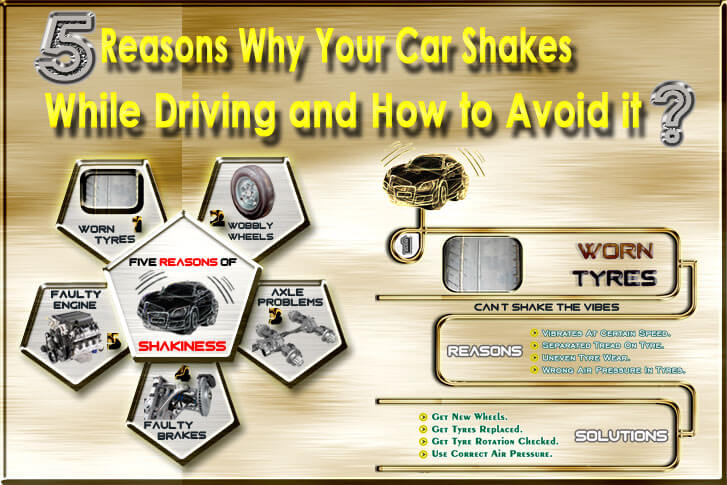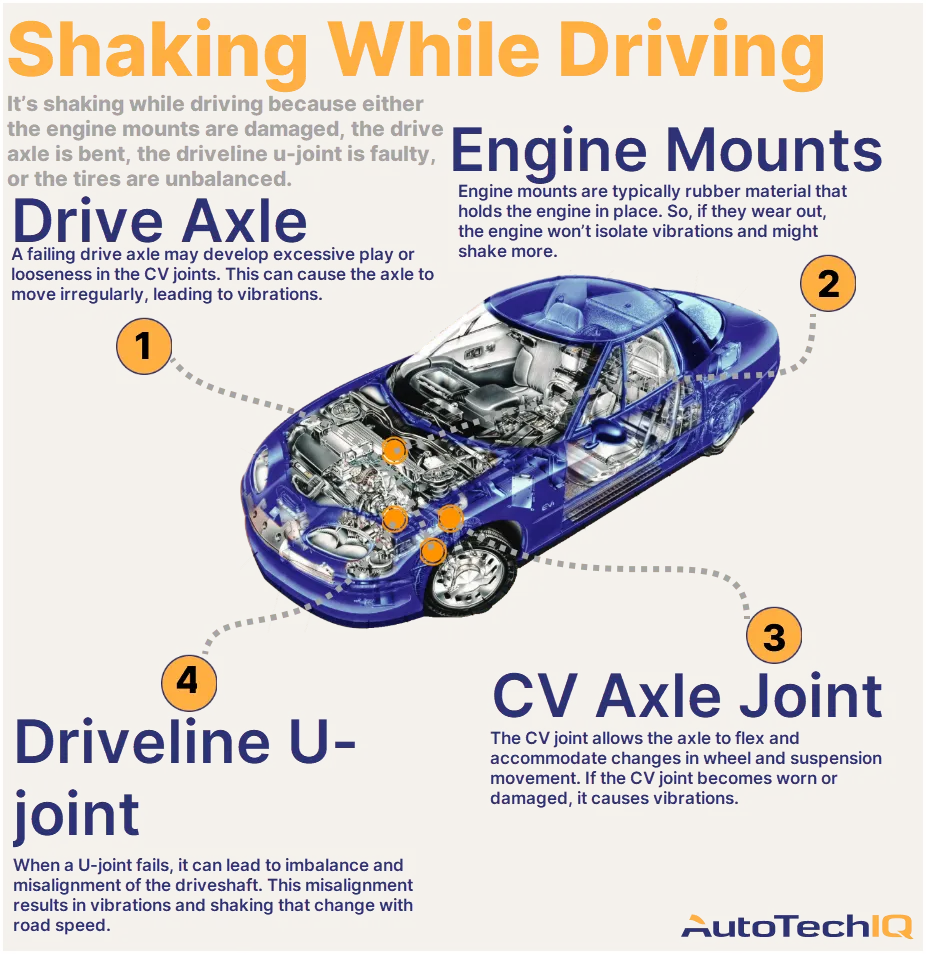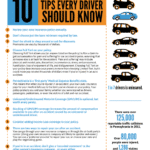Car shaking while driving can be unsettling. It often signals an underlying issue.
When your car shakes, it can be due to several reasons. These issues can range from minor to severe. Some might be easy to fix, while others need a mechanic. Understanding why your car shakes is crucial. It helps in addressing the problem early.
This blog will explore common causes of car shaking. We will also provide insights on how to handle them. Whether it’s a simple tire issue or a more complex engine problem, knowing the signs can save you time and money. Let’s dive into the reasons and solutions for a smoother, safer drive.

Credit: www.enginecompare.co.uk
Common Causes Of Car Shaking
Experiencing your car shaking while driving can be unsettling. This issue can arise from various causes. Understanding these common causes can help you diagnose and address the problem efficiently.
Tire Issues
Tires are a frequent cause of car shaking. Uneven tire wear can lead to vibrations. Ensure your tires are properly balanced. This helps maintain a smooth ride. Low tire pressure can also contribute to shaking. Check and adjust your tire pressure regularly. Damaged or worn-out tires need replacement to avoid shaking and ensure safety.
Engine Problems
The engine is another key area to consider. A misfiring engine can cause vibrations. This occurs when the fuel-air mixture doesn’t ignite properly. Regular engine maintenance can prevent such issues. Faulty spark plugs are a common culprit. Replacing old spark plugs can improve engine performance. Worn engine mounts can also lead to shaking. They support the engine and absorb vibrations. If damaged, they need immediate replacement.

Credit: www.youtube.com
Tire Problems
Experiencing a shaky car while driving can indicate tire issues. Uneven tire wear or improper alignment often causes this. Regular checks and maintenance are crucial to ensure smooth rides and avoid further damage.
When your car starts shaking while driving, your tires could be the main culprit. Tires are the only part of your vehicle that directly touches the road. Any issue with them can lead to vibrations or shakes. Understanding common tire problems can save you from more significant issues down the road.
Uneven Tire Wear
Uneven tire wear is a common cause of your car shaking. If your tires wear out unevenly, it usually results from improper alignment or suspension issues. You might notice one side of the tire is more worn than the other. Imagine driving with a wobbly wheel. The vehicle vibrates, and so does your comfort. By regularly rotating your tires and ensuring proper alignment, you can prevent this issue.
Balancing Issues
Balancing issues can make your car feel like it’s dancing on the road. If your tires are not balanced correctly, you will feel vibrations, especially at higher speeds. This imbalance happens when the weight distribution around the tire is uneven. Consider the last time you drove and felt a rhythmic vibration. It can be annoying and unsafe. To fix this, visit a professional to balance your tires. They will add small weights to ensure even weight distribution. Have you ever checked your tires for these problems? Ignoring them can lead to more serious issues like suspension damage or increased tire wear. Regular maintenance and checks can keep your ride smooth and safe. Don’t let small issues turn into costly repairs!
Engine And Transmission Concerns
Driving should be a smooth experience. But if your car starts shaking, it can be quite alarming. One common culprit is issues with the engine and transmission. These are crucial components of your vehicle. Let’s dive into some specific problems you might encounter.
Faulty Spark Plugs
Spark plugs are small but mighty. They ignite the fuel in your engine. If they’re faulty, the engine misfires. This can make your car shake.
Have you ever felt a sudden jolt while accelerating? That could be due to worn-out spark plugs. Replacing them is often a quick fix.
Regular maintenance can prevent this issue. Check your spark plugs if you feel your car shaking. It’s a simple step that can save you a lot of hassle.
Transmission Malfunctions
Your transmission shifts the gears in your car. When it malfunctions, you’ll notice. Shaking while driving can be a sign of transmission issues.
A common symptom is the car jerking when you change gears. Another is a delay in acceleration. Both can indicate a problem with the transmission.
Regular servicing can keep your transmission in good shape. If you suspect a problem, consult a mechanic. Early detection can prevent more severe damage.
Have you faced these issues? What steps did you take to resolve them? Share your experiences in the comments. Your insights could help others!
Suspension System Faults
The suspension system plays a crucial role in your car’s performance. It keeps your ride smooth and safe. Faults in this system may cause your car to shake. Addressing these issues helps maintain a stable drive. Let’s explore common suspension problems.
Worn-out Shock Absorbers
Shock absorbers control the bounce of your car. They absorb impacts from the road. Worn-out shocks cannot do their job well. This results in a rougher ride. Your car might shake or bounce too much. Look for oil leaks around the shocks. This is a sign they may need replacement. Replacing worn shocks improves stability and comfort.
Loose Steering Components
Loose steering parts can cause your car to shake. They affect your ability to steer safely. Common issues include loose tie rods or ball joints. These parts connect the wheels to the suspension. When they’re loose, the vehicle feels unstable. You might notice vibration through the steering wheel. Regular checks can catch these problems early. Tightening or replacing components restores smooth driving.
Brake System Complications
A car shaking while driving can be alarming. This unsettling experience often ties back to brake system complications. The brake system is vital for safety and smooth driving. When issues arise, they can cause vibrations and shaking. Understanding these problems helps in maintaining a stable ride.
Warped Brake Rotors
Warped brake rotors are a common culprit of car shaking. Rotors are discs connected to each wheel. They help slow the car when brakes are applied. Over time, heat can warp these rotors. Warping causes an uneven rotor surface. This results in vibrations felt through the steering wheel. Regular checks can prevent this issue.
Mechanics can measure rotor thickness. If uneven, replacing or resurfacing may be necessary. Keeping rotors in good shape ensures a smoother drive.
Sticking Brake Calipers
Sticking brake calipers may also cause car shaking. Calipers squeeze the brake pads against the rotors. This action slows the vehicle. Sometimes, calipers can stick due to rust or dirt. When they don’t release properly, it leads to uneven braking. This can cause noticeable shaking.
Regular cleaning helps prevent sticking calipers. Checking brake fluid levels is also important. Low fluid can cause caliper issues. Addressing these problems early keeps your ride steady.
Exhaust System Troubles
Your car shaking while driving can be unsettling. One often overlooked cause is exhaust system troubles. If you’ve ever felt like your car’s performance is off, it might be worth checking the exhaust system. Problems here can not only cause vibrations but affect your vehicle’s efficiency too. Let’s dive into some specific exhaust system issues that could be causing the shakes.
Damaged Exhaust Pipes
Exhaust pipes play a crucial role in channeling harmful gases away from the engine. If they’re damaged, you might notice a rough ride. Picture this: driving down the road, and suddenly your car starts vibrating. Could it be a pothole? Maybe. But if the exhaust pipes are cracked or corroded, they could be the real culprit.
Think about the impact of road debris or salt on your pipes. These elements can cause wear and tear. Regular inspections can help catch these issues early. Have you noticed any unusual sounds while driving? It could be a sign that your exhaust pipes need attention.
Loose Muffler
Have you ever heard a rattling noise beneath your car? A loose muffler might be to blame. This component helps reduce engine noise and emissions. If it’s loose, your car might shake more than usual. Imagine driving and feeling the vibrations intensify—it’s not just uncomfortable; it can be a sign of bigger issues.
Inspecting your muffler might reveal loose connections or missing clamps. Have you checked your muffler lately? Ensuring it’s securely attached can save you from those pesky shakes. A simple check could make a big difference in your driving experience.
It’s easy to overlook exhaust system troubles. But next time your car shakes, consider these common issues. Regular checks and maintenance can keep your ride smooth and enjoyable. What steps will you take to ensure your exhaust system is in top shape?
Diagnosing The Issue
Experiencing your car shaking while driving can be unsettling. The vibrations might indicate underlying issues that need attention. Diagnosing the cause is crucial to ensure safety on the road. Understanding what might trigger these shakes helps in resolving them effectively. Let’s delve into the steps involved in pinpointing the problem.
Initial Inspection
Start by checking your tires. Uneven wear or low pressure can cause vibrations. Inspect your tire treads and ensure they are balanced. Loose lug nuts might be the culprit too. Tighten them if necessary. Examine the brake system. Worn brake pads or rotors can lead to shaking. Look under the hood. A loose engine mount can result in vibrations. Checking these components can reveal obvious issues.
Professional Evaluation
If problems persist, seek a mechanic’s help. Professionals have advanced tools to diagnose issues. They will assess the suspension system. Worn suspension parts can cause instability. Mechanics can inspect the drivetrain. Faulty drive shafts might be behind the shaking. They will also evaluate the wheel alignment. Misalignment can lead to uneven tire wear. Professional evaluations ensure accurate identification of the problem.

Credit: www.youtube.com
Solutions For A Smoother Ride
Experiencing a car that shakes while driving can be unsettling. It interrupts the smooth journey you expect. Thankfully, there are solutions to address this issue. By focusing on regular maintenance and timely repairs, you can ensure a smoother ride. These practices not only improve comfort but also enhance vehicle safety.
Regular Maintenance
Regular maintenance is crucial for a smooth driving experience. It involves checking tire pressure and wheel alignment. Misaligned wheels can lead to vibrations. Balancing tires helps prevent uneven wear. Routine oil changes and filter replacements keep the engine running smoothly. These simple tasks can make a big difference.
Inspecting the suspension system is also important. Worn-out shocks or struts can cause shaking. Regularly check and replace them as needed. This ensures stability and comfort.
Timely Repairs
Timely repairs can prevent minor issues from becoming major problems. Addressing warning signs early can save you money and stress. If you notice unusual vibrations, get your vehicle checked immediately. This could be a sign of a larger issue.
Brake problems can also cause shaking. Worn-out brake pads or rotors need prompt attention. Ignoring these can lead to unsafe driving conditions. Regularly inspect these components for wear and replace them if necessary.
Don’t overlook engine issues either. A misfiring engine can cause noticeable vibrations. Regular tune-ups can help identify and fix such problems. Keeping your engine in good condition is key to a smoother ride.
Frequently Asked Questions
What Causes A Car To Shake While Driving?
A car may shake due to unbalanced tires, worn brake pads, or engine issues. Check for damaged suspension components.
Is It Safe To Drive My Car If It Shakes?
Driving a shaking car is unsafe. It might indicate problems like tire imbalance or engine issues. Get it checked by a mechanic immediately to prevent potential hazards and costly repairs. Ensuring your car’s stability keeps you and others on the road safe.
How Do I Fix My Car From Shaking When I Drive?
Check tire balance, alignment, and pressure. Inspect suspension and steering components. Replace worn-out parts. Consult a mechanic.
Is Car Shaking A Transmission Problem?
Car shaking can be a transmission issue, but other causes exist. Check for engine misfires, worn tires, or brake problems. Consult a mechanic for a precise diagnosis. Regular maintenance helps prevent shaking and ensures smooth driving. Ignoring the issue could lead to costly repairs.
Conclusion
Experiencing a car shaking while driving can be alarming. It often points to underlying issues. Tires, brakes, or engine problems might be the cause. Regular maintenance can help identify and fix these issues early. Pay attention to unusual vibrations or sounds.
They often signal something’s wrong. Addressing these problems promptly ensures safety on the road. It also avoids costly repairs later. Always consult a professional mechanic for accurate diagnosis. Keep your car in top condition for a smoother drive. Prioritize safety and enjoy peace of mind while driving.













